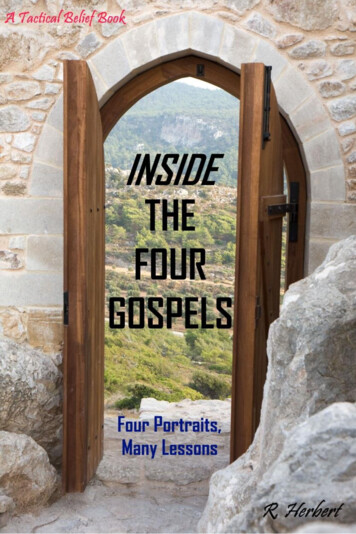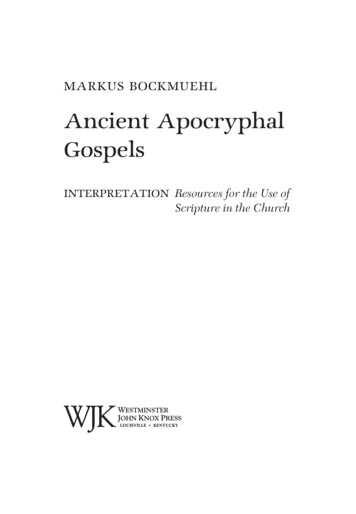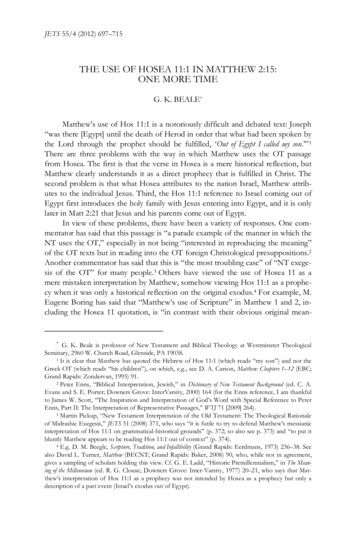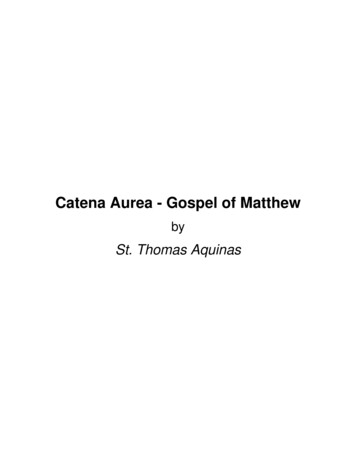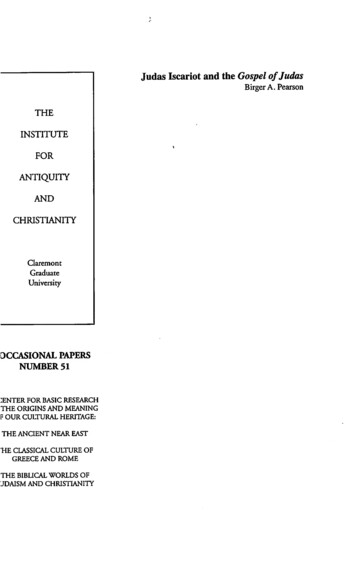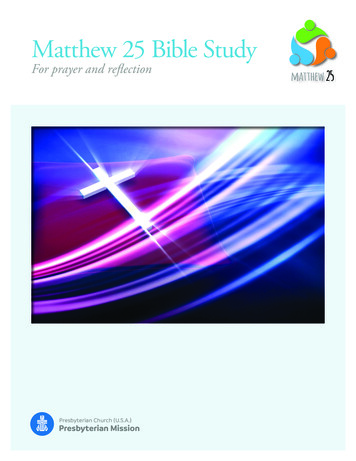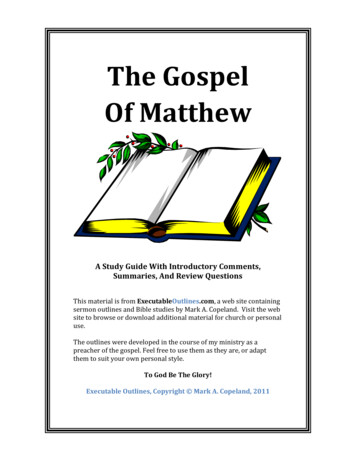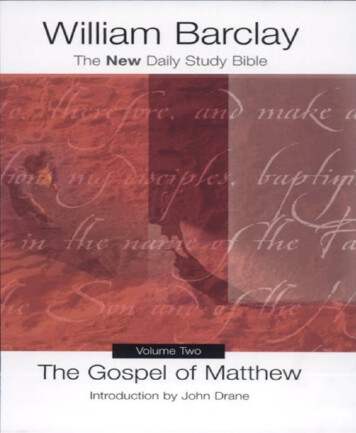
Transcription
The New Daily Study BibleThe Gospel ofMatthewVolume 11William Barclay
The William Barclay Estate, 1975, 2001Originally published in 1957 as The Daily StudyBible: The Gospel of Matthew, Volume 2 bySaint Andrew Press. 121 George Street,Edinburgh EH2 4YNRevised and updated by Saint Andrew Press,2001Published in the United States byWestminster John Knox PressLouisville, KentuckyAll rights reserved. No part of this book may bereproduced or transmitted in any form or by anymeans, electronic or mechanical, includingphotocopying, recording, or by any informationstorage or retrieval system, without permission in
writing from the publisher. For information,address Westminster John Knox Press, 100Witherspoon Street, Louisville, Kentucky 402021396.The Scripture quotations contained herein arefrom The New Revised Standard Version of theBible. Anglicized Edition, copyright 1989,1995 by the division of Christian Education of theNational Council of the Churches of Christ in theUnited States of America, and are used bypermission. All rights reserved.Cover design by McColl Productions Ltd., bycourtesy of Saint Andrew PressPRINTED IN THE UNITED STATES OFAMERICA
05 06 07 08 09 10 — 10 9 8 7 6 5 4A catalog card for this book is available at theLibrary of Congress.ISBN 0-664-22492-X
SERIES FOREWORD(by Ronnie Barclay)My father always had a great love for the Englishlanguage and its literature. As a student at theUniversity of Glasgow, he won a prize in theEnglish class - and I have no doubt that he couldhave become a Professor of English instead ofDivinity and Biblical Criticism. In a pre-computerage, he had a mind like a computer that couldstore vast numbers of quotations, illustrations,anecdotes and allusions; and, more remarkablystill, he could retrieve them at will. The editor ofthis revision has, where necessary, corrected andattributed the vast majority of these quotationswith considerable skill and has enhanced ourpleasure as we read quotations from Plato to T. S.Eliot.
There is another very welcome improvement inthe new text. My mother was one of five sisters,and my grandmother was a commanding figure asthe Presbyterian minister's wife in a small villagein Ayrshire in Scotland. She ran that smallcommunity very efficiently, and I always felt thatmy father, surrounded by so many women, wasmore than somewhat overawed by it all! I am surethat this is the reason why his use of Englishtended to be dominated by the words 'man', 'men'and so on, with the result that it sounded verymale-orientated. Once again, the editor has veryskilfully improved my father's English and madethe text much more readable for all of us byamending the often one-sided language.It is a well-known fact that William Barclaywrote at breakneck speed and never correctedanything once it was on paper - he took greatpride in mentioning this at every possibleopportunity! This revision, in removing repetition
and correcting the inevitable errors that hadslipped through, has produced a text free from allthe tell-tale signs of very rapid writing. It is withgreat pleasure that I commend this revision toreaders old and new in the certainty that WilliamBarclay speaks even more clearly to us all withhis wonderful appeal in this new version of hismuch-loved Daily Study Bible.Ronnie BarclayBedfordshire2001
GENERAL INTRODUCTION(by William Barclay, from the 1975edition)The Daily Study Bible series has always had oneaim - to convey the results of scholarship to theordinary reader. A. S. Peake delighted in thesaying that he was a 'theological middle-man', andI would be happy if the same could be said of mein regard to these volumes. And yet the primaryaim of the series has never been academic. Itcould be summed up in the famous words ofRichard of Chichester's prayer - to enable menand women 'to know Jesus Christ more clearly, tolove him more dearly, and to follow him morenearly'.It is all of twenty years since the first volume ofThe Daily Study Bible was published. The series
was the brain-child of the late Rev. AndrewMcCosh, MA, STM, the then Secretary andManager of the Committee on Publications of theChurch of Scotland, and of the late Rev. R. G.Macdonald, OBE, MA, DD, its Convener.It is a great joy to me to know that all throughthe years The Daily Study Bible has been used athome and abroad, by minister, by missionary, bystudent and by layman, and that it has beentranslated into many different languages. Now,after so many printings, it has become necessaryto renew the printer's type and the opportunity hasbeen taken to restyle the books, to correct someerrors in the text and to remove some referenceswhich have become outdated. At the same time,the Biblical quotations within the text have beenchanged to use the Revised Standard Version, butmy own original translation of the New Testamentpassages has been retained at the beginning of
each daily section.There is one debt which I would be sadlylacking in courtesy if I did not acknowledge. Thework of revision and correction has been doneentirely by the Rev. James Martin, MA, BD,Minister of High Carntyne Church, Glasgow. Hadit not been for him this task would never havebeen undertaken, and it is impossible for me tothank him enough for the selfless toil he has putinto the revision of these books.It is my prayer that God may continue to useThe Daily Study Bible to enable men better tounderstand His word.William BarclayGlasgow1975(Published in the 1975 edition)
GENERAL FOREWORD(by John Drane)I only met William Barclay once, not long afterhis retirement from the chair of Biblical Criticismat the University of Glasgow. Of course I hadknown about him long before that, not leastbecause his theological passion - the Bible - wasalso a significant formative influence in my ownlife and ministry. One of my most vivid memoriesof his influence goes back to when I was workingon my own doctoral research in the NewTestament. It was summer 1971, and I was aleader on a mission team working in the north-eastof Scotland at the same time as Barclay's BairdLectures were being broadcast on nationaltelevision. One night, a young Ph.D. scientist whowas interested in Christianity, but still unsure
about some things, came to me and announced:'I've just been watching William Barclay on TV.He's convinced me that I need to be a Christian;when can I be baptized?' That kind of thing did nothappen every day. So how could it be thatBarclay's message was so accessible to peoplewith no previous knowledge or experience of theChristian faith?I soon realised that there was no magicingredient that enabled this apparently ordinaryprofessor to be a brilliant communicator. Hissecret lay in who he was, his own sense ofidentity and purpose, and above all his integrity inbeing true to himself and his faith. Born in the farnorth of Scotland, he was brought up inMotherwell, a steel-producing town south ofGlasgow where his family settled when he wasonly five, and this was the kind of place where hefelt most at home. Though his association with theUniversity of Glasgow provided a focus for his
life over almost fifty years, from his first day as astudent in 1925 to his retirement from the facultyin 1974, he never became an ivory-toweracademic, divorced from the realities of life in thereal world. On the contrary, it was hiscommitment to the working-class culture ofindustrial Clydeside that enabled him to makesuch a lasting contribution not only to the world ofthe university but also to the life of the Church.He was ordained to the ministry of the Churchof Scotland at the age of twenty-six, but was oftenmisunderstood even by other Christians. I doubtthat William Barclay would ever have chosenwords such as 'missionary' or 'evangelist' todescribe his own ministry, but he accomplishedwhat few others have done, as he took thetraditional Presbyterian emphasis on spiritualitythrough-learning and transformed it into a mosteffective vehicle for evangelism. His ownprimary interest was in the history and language of
the New Testament, but William Barclay wasnever only a historian or literary critic. Hisconstant concern was to explore how theseancient books, and the faith of which they spoke,could continue to be relevant to people of his owntime. If the Scottish churches had known how tocapitalize on his enormous popularity in the mediaduring the 1960s and 1970s, they might easilyhave avoided much of the decline of subsequentyears.Connecting the Bible to life has never been theway to win friends in the world of academictheology, and Barclay could undoubtedly havemade things easier for himself had he beenprepared to be a more conventional academic. Buthe was too deeply rooted in his own culture - andtoo seriously committed to the gospel - for that.He could see little purpose in a belief system thatwas so wrapped up in arcane and complicated
terminology that it was accessible only to experts.Not only did he demystify Christian theology, buthe also did it for working people, addressing thekind of things that mattered to ordinary folks intheir everyday lives. In doing so, he alsochallenged the elitism that has often been deeplyingrained in the twin worlds of academic theologyand the Church, with their shared assumption thatpopular culture is an inappropriate vehicle forserious thinking. Professor Barclay can hardlyhave been surprised when his predilection forwriting books for the masses - not to mentiontalking to them on television - was questioned byhis peers and even occasionally dismissed asbeing 'unscholarly' or insufficiently 'academic'.That was all untrue, of course, for his work wassoundly based in reliable scholarship and his ownextensive knowledge of the original languages ofthe Bible. But like One many centuries before him(and unlike most of his peers, in both Church and
academy), 'the common people heard him gladly'(Mark 12:37), which no doubt explains why hiswritings are still inspirational - and why it is aparticular pleasure for me personally to commendthem to a new readership in a new century.John DraneUniversity of Aberdeen2001
EDITOR'S PREFACE(by Linda Foster)When the first volume of the original Daily BibleReadings, which later became The Daily StudyBible (the commentary on Acts), was published in1953, no one could have anticipated or envisagedthe revolution in the use of language which was totake place in the last quarter of the twentiethcentury. Indeed, when the first revised edition, towhich William Barclay refers in his GeneralIntroduction, was completed in 1975, such arevolution was still waiting in the wings. But atthe beginning of the twenty-first century, inclusivelanguage and the concept of political correctnessare well-established facts of life. It has thereforebeen with some trepidation that the editing of thisunique and much-loved text has been undertaken
in producing The New Daily Study Bible.Inevitably, the demands of the new language haveresulted in the loss of some of Barclay's mostsonorous phrases, perhaps best remembered in theoften-repeated words 'many a man'. Nonetheless,this revision is made in the conviction thatWilliam Barclay, the great communicator, wouldhave welcomed it. In the discussion of Matthew9:16-17 ('The Problem of the New Idea'), heaffirmed the value of language that has stood thetest of time and in which people have 'foundcomfort and put their trust', but he also spoke of'living in a changing and expanding world' andquestioned the wisdom of reading God's word totwentieth-century men and women in ElizabethanEnglish. It is the intention of this new edition toheed that warning and to bring William Barclay'smessage of God's word to readers of the twentyfirst century in the language of their own time.In the editorial process, certain decisions have
been made in order to keep a balance betweenthat new language and the familiar Barclay style.Quotations from the Bible are now taken from theNew Revised Standard Version, but WilliamBarclay's own translation of individual passageshas been retained throughout. Where the newversion differs from the text on which Barclayoriginally commented, because of the existence ofan alternative reading, the variant text is indicatedby square brackets. I have made no attempt toguess what Barclay would have said about theNRSV text; his commentary still refers to theAuthorized (King James) and Revised StandardVersions of the Bible, but I believe that theinclusive language of the NRSV considerablyassists the flow of the discussion.For similar reasons, the dating conventions ofBC and AD - rather than the more recent andincreasingly used BCE (before the common era)and CE (common era) - have been retained.
William Barclay took great care to explain themeanings of words and phrases and scholarlypoints, but it has not seemed appropriate to selectnew terms and make such explanations on hisbehalf.One of the most difficult problems to solve hasconcerned monetary values. Barclay had his ownsystem for translating the coinage of NewTestament times into British currency. Over theyears, these equivalent values have becomeincreasingly out of date, and often the force of thepoint being made has been lost or diminished.There is no easy way to bring these equivalents upto date in a way that will continue to make sense,particularly when readers come from both sidesof the Atlantic. I have therefore followed the onlyknown yardstick that gives any feel for the valuesconcerned, namely that a denarius was a day'swage for a working man, and I have made
alterations to the text accordingly.One of the striking features of The Daily StudyBible is the range of quotations from literature andhymnody that are used by way of illustration.Many of these passages appeared withoutidentification or attribution, and for the newedition I have attempted wherever possible toprovide sources and authors. In the same way,details have been included about scholars andother individuals cited, by way of context andexplanation, and I am most grateful to ProfessorJohn Drane for his assistance in discoveringinformation about some of the more obscure orunfamiliar characters. It is clear that readers useThe Daily Study Bible in different ways. Somelook up particular passages while others workthrough the daily readings in a more systematicway. The descriptions and explanations aretherefore not offered every time an individual ismentioned (in order to avoid repetition that some
may find tedious), but I trust that the informationcan be discovered without too much difficulty.Finally, the 'Further Reading' lists at the end ofeach volume have been removed. Many newcommentaries and individual studies have beenadded to those that were the basis of WilliamBarclay's work, and making a selection from thatever-increasing catalogue is an impossible task. Itis nonetheless my hope that the exploration thatbegins with these volumes of The New DailyStudy Bible will go on in the discovery of newwriters and new books.Throughout the editorial process, manyconversations have taken place - conversationswith the British and American publishers, andwith those who love the books and find in themboth information and inspiration. RonnieBarclay's contribution to this revision of hisfather's work has been invaluable. But one
conversation has dominated the work. and that hasbeen a conversation with William Barclay himselfthrough the text. There has been a real sense oflistening to his voice in all the questioning and inthe searching for new words to convey themeaning of that text. The aim of The New DailyStudy Bible is to make clear his message, so thatthe distinctive voice, which has spoken to somany in past years, may continue to be heard forgenerations to come.Linda FosterLondon2001
INTRODUCTION(by John Drane)Matthew's gospel was written as an instructionmanual for new converts to the Christian faith especially those of Jewish background who werewondering how their long spiritual heritage mightconnect with their faith in Jesus as Messiah.Consequently, it touches on many aspects ofcommunity life, explaining the beliefs andlifestyle that should characterize the followers ofJesus. It is almost sermonic in style, no doubtbecause it had all been rehearsed in meetings ofthe Christian community long before it waswritten down.William Barclay was particularly good atexpounding this kind of material, because it gavehim a chance to comment on the Church in his own
day. Matthew is far more strident than the othergospels in condemning Jewish religious leaders,and even in his choice of titles for such passagesBarclay jumps instantly across the centuries to theChurch he knew. 'Making Religion a Burden', 'TheReligion of Ostentation', 'The Lost Sense ofProportion' and 'Disguised Decay' sum up hiscomments on the Pharisees (chapter 23), throughwhom he then lays into church leaders of his owngeneration.Few would question Barclay's analysis of thestate of the Church in the west - especially inview of the chronic decline that has set in since hewrote - but his emphasis on contemporaryapplication does sometimes mean that he ignoresother equally valid questions. For example, didMatthew go beyond valid criticism of destructivereligious scruples and engage in a bit of antisemitism - and if he did, how does that relate tothe Church's apparent silence at the time of the
Holocaust?Barclay never says, perhaps because in his daythese questions were only beginning to beaddressed in society at large. Nor does he ask ifthe 'Great Commission' of 28:16-20 was given byJesus in the first place, or if it might have inspiredthe later imperialistic expansion of westernempires in the name of Christ. I mention thesethings, not to criticize Barclay - who could onlybe a person of his own time - but to highlightsome of the ways in which interpreting the Biblehas become infinitely more complex for us than itwas for him. Yet in addressing these newerquestions, we must still begin with the text, itslanguage and original meanings and intentions,and in close textual study Barclay is still as gooda guide as ever he was.John Drane
University of Aberdeen2001
THE SIX ACCENTS IN THEVOICE OF JESUSMatthew 11 is a chapter in which Jesus isspeaking all the time; and, as he speaks todifferent people about different things, we hearthe accent of his voice vary and change. It will beof the greatest interest to look one by one at thesix accents in the voice of Jesus.
THE ACCENT OF CONFIDENCEMatthew 11:1-6And when Jesus had completed hisinstructions to the twelve disciples, heleft there to go on teaching and to go onmaking his proclamation in their towns.When John had heard in prison aboutthe things that the Anointed One of Godwas doing, he sent to him and asked himthrough his disciples: 'Are you the onewho is come, or must we go onexpecting another?' 'Go back,' saidJesus, 'and give John the report of whatyou are hearing and seeing. The blindare having their sight restored, and thelame are walking; the lepers are beingcleansed, and the deaf are hearing; the
dead are being raised up, and the poorare receiving the good news. Andblessed is the man who does not takeoffence at me.'The career of John had ended in disaster. It wasnot John's habit to soften the truth for anyone; andhe was incapable of seeing evil without rebukingit. He had spoken too fearlessly and too definitelyfor his own safety.Herod Antipas of Galilee had paid a visit to hisbrother in Rome. During that visit, he seduced hisbrother's wife. He came home again, dismissedhis own wife and married the sister-in-law whomhe had lured away from her husband. Publicly andsternly, John rebuked Herod. It was never safe torebuke a despot, and Herod took his revenge; Johnwas thrown into the dungeons of the fortress ofMachaerus in the mountains near the Dead Sea.
For any human being, that would have been aterrible fate; but for John the Baptist, it was worsethan for most. He was a child of the desert; all hislife he had lived in the wide-open spaces, withthe clean wind on his face and the spacious vaultof the sky for his roof. And now he was confinedwithin the four narrow walls of an undergrounddungeon. For someone like John, who had perhapsnever lived in a house, this must have been agony.In Carlisle Castle, there is a little cell. Once,long ago, a border chieftain was imprisoned inthat cell and left there for years. In that cell thereis one little window, which is placed too high foranyone standing on the floor to look out. On theledge of the window, there are two depressionsworn away in the stone. They are the marks of thehands of that border chieftain, the places where,day after day, he lifted himself up by his hands tolook out on the green valleys across which hewould never ride again.
John must have been like that: and there isnothing to wonder at, and still less to criticize, inthe fact that questions began to take shape inJohn's mind. He had been so sure that Jesus wasthe one who was to come. That was one of themost common titles of the Messiah for whom theJews waited with such eager expectation (Mark11:9; Luke 13:35, 19:38; Hebrews 10:37; Psalm118:26). Those who face death cannot afford tohave doubts; they must be sure; and so John senthis disciples to Jesus with the question: 'Are youhe who is to come, or shall we look for another?'There are many possible things behind thatquestion.(1) Some people think that the question wasasked, not for John's sake at all, but for the sakeof his disciples. It may be that when John and hisdisciples talked in prison, the disciplesquestioned whether Jesus was really he who was
to come, and John's answer was: 'If you have anydoubts, go and see what Jesus is doing and yourdoubts will be at an end.' If that is the case, it wasa good answer. If anyone begins to argue with usabout Jesus, and to question his supremacy, thebest of all answers is not to counter argument withargument, but to say: 'Give your life to him; andsee what he can do with it.' The supreme argumentfor Christ is not intellectual debate, butexperience of his changing power.(2) It may be that John's question was thequestion of impatience. His message had been amessage of doom (Matthew 3:7-12). The axe wasat the root of the tree: the winnowing process - theseparation of grain from chaff, good from bad had begun; the divine fire of cleansing judgmenthad begun to burn. It may be that John wasthinking: 'When is Jesus going to start on action?When is he going to blast his enemies? When isthe day of God's holy destruction to begin?' It may
well be that John was impatient with Jesusbecause he was not what he expected him to be.Those who wait for savage wrath will always bedisappointed in Jesus, but those who look for lovewill never find their hopes defeated.(3) Some have thought that this question wasnothing less than the question of dawning faithand hope. He had seen Jesus at the baptism; inprison he had thought more and more about him:and the more he thought, the more certain he wasthat Jesus was he who was to come; and now heput all his hopes to the test in this one question. Itmay be that this is not the question of a despairingand an impatient man, but the question of one inwhose eyes the light of hope shone, and whoasked for nothing but confirmation of that hope.Then came Jesus' answer; and in his answer wehear the accent of confidence. Jesus' answer toJohn's disciples was: 'Go back, and don't tell John
what I am saying; tell him what I am doing. Don'ttell John what I am claiming; tell him what ishappening.' Jesus demanded that there should beapplied to him the most acid of tests, that ofdeeds. Jesus was the only person who could everdemand without qualification to be judged not bywhat he said but by what he did. The challenge ofJesus is still the same. He does not so much say'Listen to what I have to tell you' as 'Look what Ican do for you; see what I have done for others.'The things that Jesus did in Galilee he stilldoes. In him, those who were blind to the truthabout themselves, about their neighbours andabout God have their eyes opened; in him, thosewhose feet were never strong enough to remain inthe right way are strengthened; in him, those whowere tainted with the disease of sin are cleansed;in him, those who were deaf to the voice ofconscience and of God begin to listen; in him,those who were dead and powerless in sin are
raised to newness and loveliness of life; in him,the poorest people inherit the riches of the love ofGod.Finally comes the warning: 'Blessed is he whotakes no offence at me.' This was spoken to John:and it was spoken because John had only graspedhalf the truth. John preached the gospel of divineholiness with divine destruction; Jesus preachedthe gospel of divine holiness with divine love. SoJesus says to John: 'Maybe I am not doing thethings you expected me to do. But the powers ofevil are being defeated not by irresistible power,but by unanswerable love.' Sometimes people canbe offended at Jesus because Jesus cuts acrosstheir ideas of what religion should be.
THE ACCENT OF ADMIRATIONMatthew 11:7-11When they were going away, Jesusbegan to speak to the crowds aboutJohn. 'What did you go out to the desertto see?' he said. 'Was it a reed shakenby the wind? If it was not that, what didyou go out to see? Was it to see a manclothed in luxurious clothes? Look you,the people who wear luxurious clothesare in kings' houses. If it was not that,what did you go out to see? Was it tosee a prophet? Indeed it was, I tell you,and something beyond a prophet. This ishe of whom it stands written: "Lookyou, I am sending before you mymessenger, who will prepare your way
before you." This is the truth I tell you among those born of women no greaterfigure than John the Baptizer has everemerged in history. But the least in thekingdom of heaven is greater than he is.'There are few to whom Jesus paid so tremendousa tribute as he did to John the Baptizer. He beginsby asking the people what they went into thedesert to see when they streamed out to John.(1) Did they go out to see a reed shaken by thewind? That can mean one of two things, (a) Downby the banks of the Jordan, the long cane grassgrew; and the phrase a shaken reed was a kind ofproverb for the commonest of sights. When thepeople flocked to see John, were they going out tosee something as ordinary as the reeds swaying inthe wind on the Jordan's banks? (b) A shaken reedcan mean a weak waverer, one who could no
more stand firm against the winds of danger than areed by the river's bank could stand straight whenthe wind blew.Whatever else the people flocked out to thedesert to see, they certainly did not go to see anordinary person. The very fact that they did go outin their crowds showed how extraordinary Johnwas, for no one would cross the street, let alonejourney into the desert, to see a commonplacekind of person. Whatever else they went out tosee, they did not go to see a weak or indecisiveperson. Pliable people do not end in prison asmartyrs for the truth. John was neither as ordinaryas a shaken reed, nor as spineless as the reedwhich sways with every breeze.(2) Did they go out to see a man clothed in softand luxurious garments? Such a man would be acourtier; and, whatever else John was, he was nota courtier. He knew nothing of the courtier's art of
the flattery of kings; he followed the dangerousoccupation of telling the truth to kings. John wasthe ambassador of God, not the courtier of Herod.(3) Did they go out to see a prophet? Prophetsare the forthtellers of the truth of God. Prophetsare those who are in God's confidence. 'Surely theLord God does nothing, without revealing hissecret to his servants the prophets' (Amos 3:7).Prophets are two things - they are people with amessage from God, and they are people with thecourage to deliver that message. Prophets arepeople with God's wisdom in their minds, God'struth on their lips and God's courage in theirhearts. And most certainly John had all thosecharacteristics.(4) But John was something more than aprophet. The Jews had, and still have, one settledbelief. They believed that before the Messiahcame, Elijah would return to herald his coming.
To this day, when the Jews celebrate the PassoverFeast, a vacant chair is left for Elijah. 'Lo, I willsend you the prophet Elijah before the great andterrible day of the Lord comes' (Malachi 4:5).Jesus declared that John was nothing less than thedivine herald whose duty and privilege it was toannounce the coming of the Messiah. John wasnothing less than the herald of God, and no onecould have a greater task than that.(5) Such was the tremendous tribute of Jesus toJohn, spoken with the accent of admiration. Therehad never been a greater figure in all history; andthen comes the startling sentence: 'But the least inthe kingdom of heaven is greater than he.'Here, there is one quite general truth. WithJesus, there came into the world somethingabsolutely new. The prophets were great: theirmessage was precious; but with Jesus thereemerged something still greater, and a message
still more wonderful. The scholar C. G.Montefiore, himself a Jew and not a Christian,writes: 'Christianity does mark a new era inreligious history and in human civilization. Whatthe world owes to Jesus and to Paul is immense;things can never be, and men can never think, thesame as things were, and as men thought, beforethese two great men lived.' Even a non-Christianfreely admits that things could never be the samenow that Jesus has come.But what was it that John lacked? What is it thatthe Christian has that John could never have? Theanswer is simple and fundamental. John hadnever seen the cross. Therefore one thing Johncould never know - the full revelation of the loveof God. The holiness of God he might know; thejustice of God he might declare; but the love ofGod in all its fullness he could never know.
Bible (the commentary on Acts), was published in 1953, no one could have anticipated or envisaged the revolution in the use of language which was to take place in the last quarter of the twentieth century. Indeed, when the first revised edition, to which William Barclay refers i


